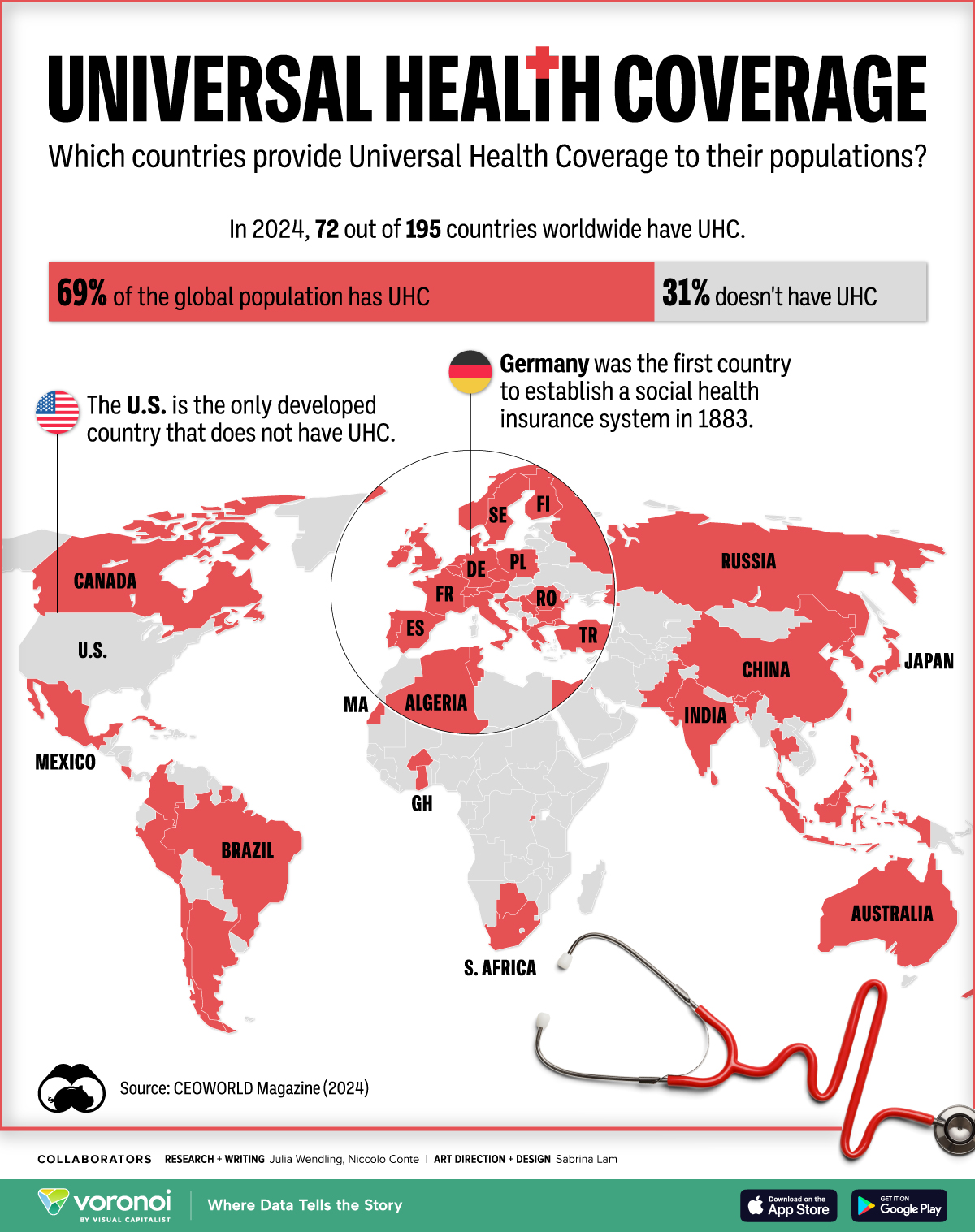If you’ve been following U.S. politics at all, you’ve probably heard the term “Medicare for All” or “Universal healthcare (UHC)” over the decades. Progressive politicians and activists promote it while Conservatives demonize it.
Facts:
Almost 45,000 Americans die every year because they lack access to health insurance.
The United States is the only developed country that does NOT provide universal healthcare for its citizens.
The U.S. could provide universal healthcare if politicians didn’t own stock in private health insurance and drug companies that pay them not to change our system.
Get money out of politics
Our government would listen to us and work for us (like they’re supposed to) if we were successful in getting money out of politics.

So what exactly is it, and how has the fight progressed? (If you’re progressive, you already know all of this. I created this page to educate people who might not be familiar with the concept of universal healthcare).
People might have only been exposed to it by media pundits or podcasters who bash it for being “woke” or who lie about it “costing too much,” when, in reality, Medicare for All would save the country billions of dollars every year.
Let’s talk about where it started and where the movement is now.
The Birth of an Idea
While universal healthcare might seem like a new “woke” concept, it’s actually been around in American politics for over a century. President Theodore Roosevelt included it in his platform way back in 1912!
He believed a ‘strong country requires healthy people.’
But the modern Medicare for All movement really kicked into high gear during Bernie Sanders‘ 2016 presidential campaign, when he made it a cornerstone of his platform.
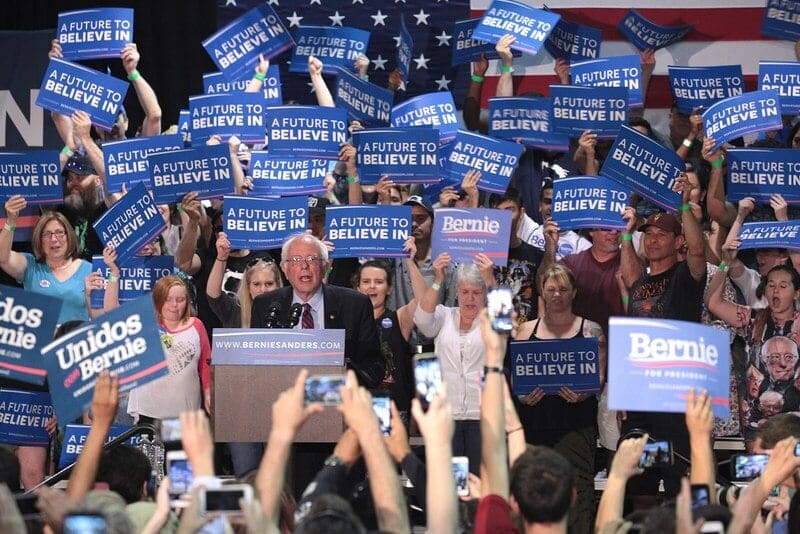
His idea builds on Medicare, the popular government health insurance program for seniors that’s been around since 1965.
The basic concept? Expand that coverage to everyone, regardless of age. Treat healthcare as a basic human right. We have over 40,000 people dying every year in this country because they don’t have access to health insurance.
The wealthiest country in the world with state-of-the-art medical facilities, has citizens dying only because they don’t have health insurance.
In America, you can’t get, or afford, medical care without insurance. Our country also ties health insurance to employment—possibly in order to force Americans to work until they can access Medicare at age 65 (although Republicans are trying to raise the retirement age).
So, if you don’t have a job and can’t afford the high premiums of private health insurance, you will just die if you get a terminal illness or are seriously injured.
Because insurance is required in order to access medical care, it should be a basic right of all Americans: access to healthcare. That’s where Medicare For All comes in.
Sanders made it less complex and hassle-free by intertwining universal healthcare and a government health insurance program that already exists. The government just needs to allow access to all Americans, not just people over 65 or people with certain disabilities.
This simplification is perfect for dealing with a government that likes to deny progressive policy proposals because they are “too complicated. ” There’s already a fully staffed department (2025 update: maybe not after DOGE) and a national network of doctors that accept Medicare.
It’s as simple as announcing that “All citizens have Medicare now”. Although federal employees are currently working with antiquated computer systems and programs that may not be equipped to handle a major influx of Medicare recipients. CMS would need to handle those preparations beforehand.
What Would Medicare for All Actually Do?
Picture this: You wake up feeling sick. Instead of wondering whether you can afford to visit the doctor or if they’re “in-network,” you just… go. No premiums, no deductibles, no copays. That’s the core concept of Medicare for All.
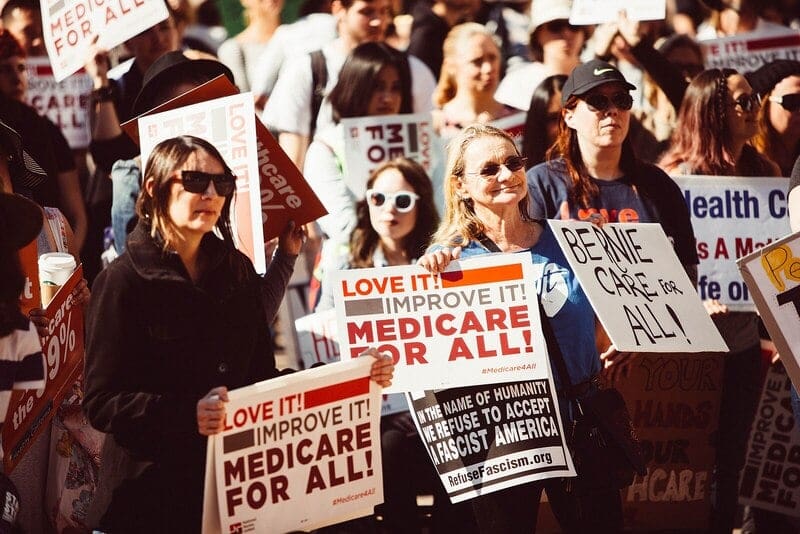
Here’s what it would mean in practice:
Every American would have comprehensive health coverage.
All essential medical services would be covered (think doctor visits, hospital stays, prescription drugs, mental health care, dental, vision – the works).
Private insurance companies would be largely eliminated from the healthcare equation.
Healthcare would be funded by our taxes instead of paying premiums and out-of-pocket costs.
(I should tell you this: In countries with universal healthcare (and other great policies), citizens pay higher taxes. However, people living in those countries say that it’s worth it when you consider how much money you are saving in doctor visit copays, prescription copays, and health insurance premiums).
Where Are We Now?
Challenges
Here’s the truth: Universal healthcare faces some pretty steep hurdles. While polls show that the majority of Americans support the general concept of universal healthcare, getting there is complicated.
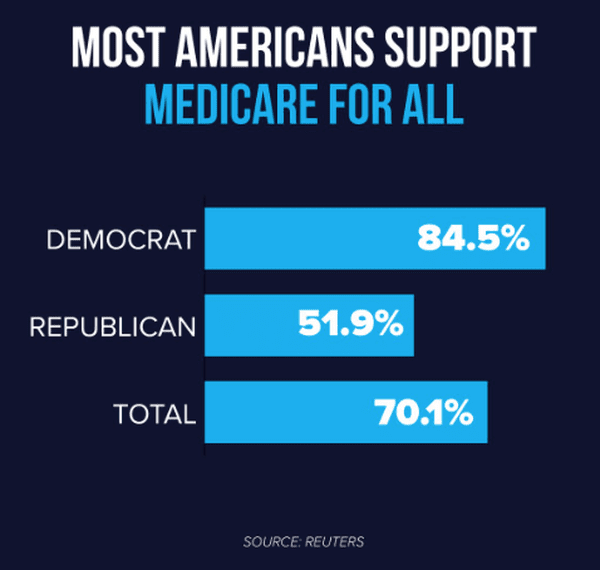
The healthcare industry makes up about one sixth of the U.S. economy, and changing that system in a capitalist country is like trying to turn around a cruise ship in a swimming pool – it’s not exactly easy. Insurance companies, some healthcare providers, and many politicians have pushed back hard against the idea.
As of 2025, we’ve seen some movement at the state level. States like California and Vermont have explored their own versions of single-payer healthcare (another term used for universal healthcare), though they’ve run into funding and implementation challenges.
At the federal level, while Medicare for All legislation has been introduced in Congress, it hasn’t made it to the floor for a vote.
What’s Next?
The conversation around Medicare for All isn’t going away anytime soon. More Americans are struggling with medical debt than ever before, and healthcare costs keep rising. In 2021, Americans had at least $220 billion in medical debt. While full Medicare for All might not be right around the corner, we’re seeing growing support for expanding healthcare access through other means:
Lowering the Medicare eligibility age.
Creating a public option to compete with private insurance.
Funding Medicaid and Medicare by lifting the cap on people making over a certain amount per year who are no longer taxed. Billionaires are able to avoid paying Medicare taxes.
Expanding Medicaid coverage (Some Republican governors refuse to expand Medicaid in their states. Instead they send the federal funding they receive that was meant to give more people access to healthcare back to the government. It makes absolutely no sense not to implement something you’ve been provided with the funding for.
It comes down to partisan politics—Democratic Presidents are usually the ones sending the funding. The Republican party’s disdain for “us poors” and the entire concept of government assistance are another reason they refuse the funds.
Americans pay taxes to the government. Members of Congress will refuse to implement certain policies meant to help the American people because they don’t want to spend the money.
Remember Senator Sinema’s thumbs-down “curtsy” when she voted on the bill for $15 minimum wage?
It’s Americans’ money they’re using to fund everything.
When it comes to foreign wars or the Defense budget, they will approve trillions of dollars in funding. They only complain about spending when it’s something that will improve the lives of the average American.
In a democracy the people are supposed to make decisions about what they want through their representatives.
That’s obviously not the way it’s working when you see that 70% of the country supports universal healthcare.
Republican-led states have the highest rates of uninsured people in their states.
Yet those people continue to vote Republicans back in charge.
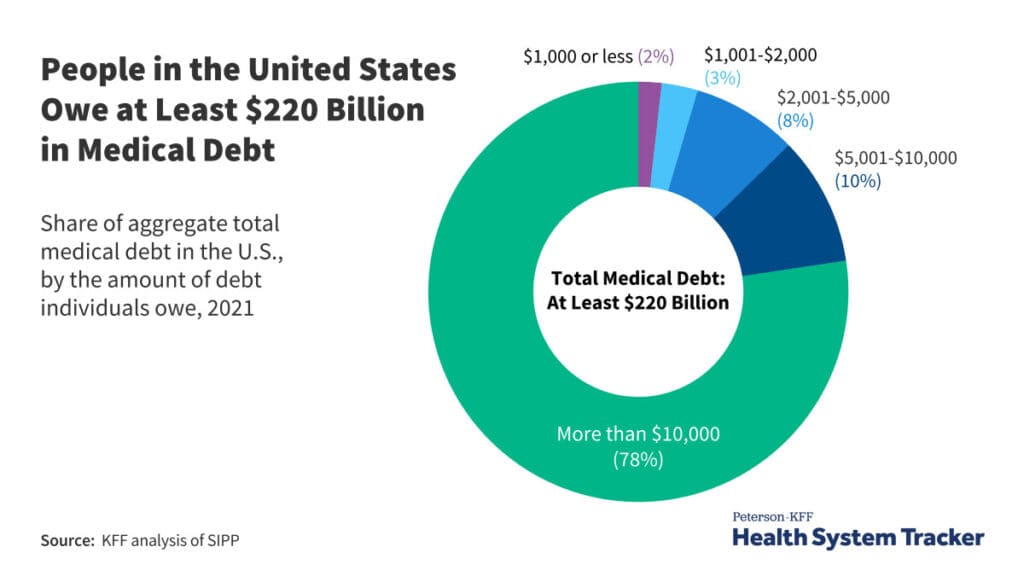
Strengthening the Affordable Care Act (Donald Trump and Republicans have been trying to repeal it for years, along with the part that prevents health insurance companies from being able to deny anyone because of pre-existing conditions. Speaker Mike Johnson recently told a crowd they were definitely going to do it if Trump won the 2024 election. And he did.
The Bottom Line
Whether you’re all in on Universal Healthcare or skeptical about making the change, one thing’s clear: our healthcare system needs work.
The debate over Medicare for All has pushed important questions about healthcare access and affordability into the spotlight. Luigi Mangione ignited a national debate about the current state of healthcare in the United States.
So what happens next? That’s up to voters, activists, and politicians to figure out. But at least now you know what everyone’s talking about when Medicare for All comes up at the Thanksgiving dinner table.
Want to learn more? Check out official government sources or healthcare policy research organizations for the latest developments in healthcare reform.
You can join us in the fight for this and other positive change by becoming a member of our community. It’s free to join!
Share the knowledge!

